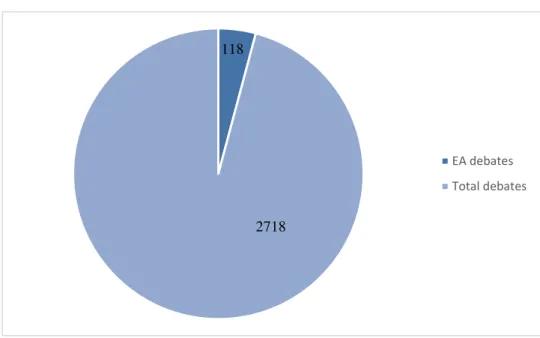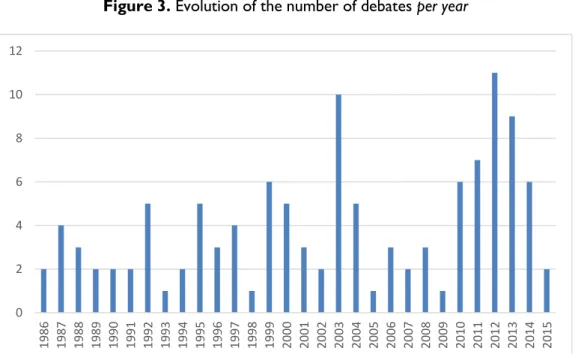Research Notes on Parliamentary Democracy 14/2016
More, better, or another way for Europe: the debates
on EU affairs at the Portuguese parliament
Alice Cunha
Series Editors:
Katrin Auel and Resul Umit
This research note series is published by the
PADEMIA: Parliamentary Democracy in Europe.
1
More, better, or another way for Europe: the debates on EU
affairs at the Portuguese parliament
Alice Cunha
The plenary is arguably the most important platform for members of parliament (MPs) to communicate not only with the other MPs but also with the general public. Drawing on the debates held in the plenary of the Portuguese parliament over the period 1986–2015, Alice Cunha analyses how Portuguese MPs envision the European integration process and evaluate the country’s EU membership. The results show that about 4% of all plenary sessions were about EU affairs during the last 30 years, with some question marks over the substance of the debates in these sessions.
National parliaments have come a long way regarding European integration, and the Portuguese parliament – Assembleia da República – is no exception. Its powers in the field of European integration evolved, in part, in accordance with the developments of the European Union (EU) itself, yet its adaptation had a reactive and minimalist character. There was, in fact, an effort to adapt the legal and constitutional provisions in response to the European treaties but, deep down, the Assembleia da República has never gone much further than monitoring and undertaking a posteriori assessments of EU affairs. Overall, it lacks the will to assign a binding nature to its opinions on matters of its reserved competence. In this regard and over time, the Parliament adopted the position of not constraining the governments’ political action, but rather of aiming to influence it or even to complement it.
Analysing plenary debates is important for two reasons. First, as debates highlight the positon of parties and MPs, research can tell us about where these parliamentary actors stand in EU affairs. Second, plenary debates also demonstrate to what extent these actors are committed to real public discussions of the subject.
Despite the improvements – noticeably the increasing number of mandatory plenary
debates – the results show that parliamentary activity on EU affairs remains selective and varies according to the importance given to certain subjects and party’s preferences. Regardless of their ideological differences, the parties currently represented in the Assembleia da República are favorable to the country’s membership in the EU, albeit with several concerns regarding various common policies, the negotiation strategies to adopt or the way forward in European integration. As a result, most debates on EU affairs held in the plenary end up mainly focusing on the discussion whether the country should want
‘more Europe’, ‘a better Europe’ or ‘another way for Europe’.
This research note acknowledges the widespread assumption – consensual amongst the literature – that European integration has led to the strengthening of governments and to the weakening of parliaments in national political settings; and focus on the debates held in the plenary of the Portuguese
Most plenary debates on EU affairs end up to discussing whether the country should want ‘more Europe’, ‘a better Europe’ or
‘another way for Europe’
2 parliament over the last 30 years (1986–2015)
in a historical perspective. It pays attention to the evolution of the number of debates that were held and about what topics, in order to assess how the Portuguese Members of Parliament (MPs) envisioned the European integration process and evaluated the country’s EU membership. Between 1986 and
2015, and thus during nine legislative terms (IV to XII), 2718 plenary debates took place. Of those, only 118 were specifically dedicated to European issues, a total of 4%, a percentage that is in line with the findings of the literature
for other national parliaments.
Figure I. Plenary debates on European affairs at the Assembleia da República
Existing research clearly demonstrates the limited role and the little involvement of the plenary in European affairs in the various national parliaments of the EU. Still, the Portuguese parliament has a history of debating European affairs in the plenary, mostly on matters of high political salience and about the European Councils’ agendas and/or its conclusions. The discussion on common policies and legislative and non-legislative EU initiatives is mostly left to the European Affairs Committee.
The evolution of the number of debates held has had an upward trend, except during two legislatures (VIII and X). It has risen from six to 32 debates, an increase of over 500% in
almost 30 years. This evolution can, in part, be explained by the rise of the number of mandatory debates established by law, but it is also linked to the EU’s agenda itself, which:
1) brings down to the national arena the discussion of certain matters, such as the internal market or the single European currency;
2) needs the approval of national parliaments, for example in the cases of treaty revision or enlargement; 3) or calls for a greater involvement of
the national parliaments, as was the case for the Convention on the Future of Europe.
EA debates
Total debates
3 This last case, for example, was clearly the
origin of the increase to 17 debates in the IX Legislature. If we exclude the XII Legislature (which saw the increase of the number of mandatory debates on EU matters increased to seven), the average of debates per legislature was around 10.75, a remarkably low number.
There have been many fluctuations between years (as Figure 3 shows), but there was no year that did not record at least one debate (1993, 1998, 2005 and 2009). Conversely, some years stand out with a large number of debates (2003, 2012 and 2013).
Figure 2. Evolution of the number of debates per legislature
Figure 3. Evolution of the number of debates per year 6
8
12
16
8
17
9 10
32
IV V VI VII VIII IX X XI XII
0 2 4 6 8 10 12
4 As for the topics, over the years, there were
some discussions under the generic title of
‘debate on European integration’ (until 1991) or of ‘European policy’, which focused on the most pressing matters of the EU’s agenda and on the country’s membership. These debates addressed issues such as the Single Market, Common Foreign and Defense Policy, the European Monetary System, the Economic and Monetary Union (EMU), the principle of subsidiarity or economic and social cohesion. But the plenary also focused on the assessment of common policies, such as the reform of the Common Agricultural Policy and of the Common Fisheries Policy; on specific achievements, as the completion of the internal market, the creation of the EMU and the single currency; and also discussed very specific issues, such as the use of polyphosphates in the fish salting process. In sum, all major issues of the EU’s agenda have featured in the plenary of the Portuguese parliament.
Since its accession, Portugal has participated in all key moments of the process of European integration, and that is reflected in the discussions that took place in the plenary throughout the years. The debates show, however, some superficiality and lack of an analytical reading of the European reality. MPs have failed to discuss EU matters in a more in-depth manner and with more expertise. And
taking everything into account, most debates referred to a fait accompli rather than ongoing decision-making (e.g. treaty revisions – except in the case of the Convention on the Future of Europe – the enlargement’s rounds, the conclusions of the European Council’s meetings).
Finally, there is also the perception that the debates on EU issues in the plenary are little more than a ritual or a formality (mandatory in some cases and, in others, motivated by the parties or the Government’s political agenda), since the ‘real work’ of discussion and analysis is made within the European Affairs Committee and the various specialized committees, where the decisions are taken. To sum up, the Portuguese parliament carries out its legal obligations toward the European integration process and fulfills its function of debate at the plenary. Nevertheless, by reading the debates held over the last 30 years, at the end of the day one identifies a detachment among MPs toward EU affairs.
This note represents the views of the author and not those of PADEMIA.
Alice Cunha has a PhD in Contemporary History (Universidade Nova de Lisboa, 2013) and has been a researcher at the Instituto de História Contemporânea and post-doctoral fellow at the same University since 2014. She has participated in various research projects and is the author of several national and international publications all related to Portugal and European integration. Her research interests include enlargement studies, Europeanization and the history of European integration.
All major issues of the EU’s agenda have featured in the plenary, but with some rather superficial debates

